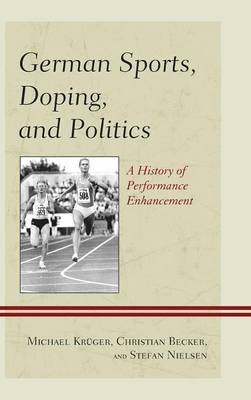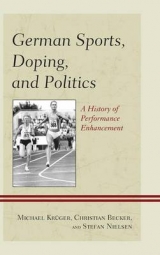German Sports, Doping, and Politics
Rowman & Littlefield (Verlag)
978-1-4422-4920-2 (ISBN)
In the Cold War era, sport was not just a symbol of the power and strength of a nation-state, but of certain ideological systems of politics. With the pressure for athletes to succeed at its zenith, many East German athletes were given anabolic steroids by their country’s own sport federation. While doping in East Germany has been intensely researched in the past decades, the state of West German athletics during this time has remained largely a mystery. In fact, doping was a common practice on both sides of the Iron Curtain. But how many athletes were involved? And who knew about these practices? In order to answer these questions, the Federal Institute for Sport Science in Germany supported a research project to shed light on the other, West German side of doping history.
Based on analyses of authentic documents and archives, German Sports, Doping and Politics: A History of Performance Enhancement is a unique study spanning from 1950-2007. Translated from its original German, and supplemented with new material written especially for an international audience, this innovative book addresses many important questions about a topic with worldwide implications. Part I deals with the history of doping in the post-war period of the 1950s and ‘60s; Part II focuses on the apex of doping, as well as the beginnings of the anti-doping movement; and Part III considers the development of doping since the Reunification and the foundation of the World Anti-Doping Agency and the National Anti-Doping Agency in Germany.
Written for a global audience, German Sports, Doping, and Politics explains and reveals the truly remarkable processes of doping and anti-doping that have evolved since the Cold War. While sports historians will find this book of great interest, it is also a significant study for anyone who wants to look beyond the surface of sports and doping as reported by the media.
Michael Krüger is professor of Physical Education and Sports History at the University of Muenster in Germany. He is council member of the International Society for the History of Physical Education and Sport (ISHPES). Christian Becker is a sports historian and publisher in Hildesheim, Germany. Stefan Nielsen is a historian and editor in Muenster, Germany.
Introduction – Basics and Problem Definition
The Role of Doping in the Relationship between Politics, Sporting Policies, and Sports
Methodological Basics: Sources and Documents
State of the Art
Scientific Debate on Doping and Public Moralization
Problems of Empirical Evaluation and Proving Doping
I. From Common Practice to Prohibition – the Beginnings of Doping and Anti-Doping in German Sport of the 1950s and 1960s
Introduction
Sport in the Federal Republic of Germany after the Second World War
Structures and Self-Perceptions of the German Federal Sports Organizations
Sports Policy
Physical Health as a Common Objective – a Legitimation for State Sponsoring
Competitive Sports and National Representation: The Delayed Start – Germany in the Context of International Sports Development
The “Medicalization” of Society and Sport and other Doping and Anti-Doping Issues
Spread and Development of Anti-Doping in the 1950s and 1960s
Self-Concept and Functions of German Sports Medicine
Anti-Doping Policies in the 1950s and 1960s
Doping Rules of Some Sports Federations
The Role of State and Government in Anti-Doping Policies
Doping During the 1950s and 1960s – Intermediate Results
II. Cold War and the Climax of Doping in Germany – From the Munich Olympics of 1972 via Montreal 1976 to the Introduction of Out-of-Competition Controls in the 1980s
Introduction
The 1972 Olympic Games of Munich and Their Importance for the Development of Doping and Anti-Doping in Germany
Anti-doping Politics of the IOC in the 1970s
Sport Politics, Doping and Anti-Doping in West Germany
Interim Results
Doping and Anti-Doping up to the Olympic Games of Montreal in 1976
Problems in Preventing Anabolic Steroids in Sport
Anabolic Steroids, their Prevalence in Top Level Sport and Doping Controls
The Doping Games of Montreal 1976: “Kolbe Injection” and “Air Clyster Scandal” – and their Political Consequences
Political Contextualization of Doping and Anti-Doping in the 1970s and 1980s
German Secret Services on Doping
Doping and West German Sports Medicine
Adaptation by West German Sport Organizations
Consequences of State and Sport Policies – the “Grundsatzerklärung für den Spitzensport” of 1977
Doping Enhancement in West German Sport
Doping and Anti-Doping Policies between 1977 and 1989
The Case of Birgit Dressel
Preventive Controls
Anti-Doping: Some Facts and Problems
A Doubtful Research Project: The Study of Rejuvenation/ Regeneration by Means of Testosterone
Introduction of Out-of-Competition Controls
Interim Results - Changes to Doping and Anti-Doping Policies during the 1970s and 1980s
III. Doping and Anti-Doping in the Process of German Reunification
State and Sport, Doping and Anti-Doping in West Germany before 1990
Revelations of Doping by the German Media after Unification
Responses from Sport and Politics
The Parliament Veto: Budget Cut in 1991/92
European and International Perspectives
The Case of Dieter Baumann – a Blow in the Fight against Doping
Interim Results: Reunification, Rehabilitation and New Beginnings
International Strategies of Anti-Doping – Germany on the Path to the World Anti-Doping Agency (WADA)
The Establishment of an International Political Anti-Doping Regime
From Lausanne to the WADA
WADA as the New Center of the International Fight against Doping
Effects of the International Anti-Doping Movement on German Anti-Doping Policies: From the Anti-Doping Commission of the German Sport Federation (DSB) to the National Anti-Doping Agency (NADA)
German Anti-Doping Crisis of 2007
The Debate on an Anti-Doping Law
Interim Results: Doping in the Context of Sport, State and Society
Conclusion
The German Story of Doping – a Relevant Element of the Overall Sports Process
Explanations for the Doping and Anti-Doping Process
Relevance of the Cold War
Changes of the Relationship between State and Sport
Bibliography
Chronology
List of abbreviations
Index
About the Authors
| Verlagsort | Lanham, MD |
|---|---|
| Sprache | englisch |
| Maße | 162 x 234 mm |
| Gewicht | 531 g |
| Themenwelt | Sachbuch/Ratgeber ► Sport |
| Geisteswissenschaften ► Geschichte ► Regional- / Ländergeschichte | |
| Geisteswissenschaften ► Philosophie ► Ethik | |
| Sozialwissenschaften ► Soziologie | |
| Weitere Fachgebiete ► Sportwissenschaft | |
| ISBN-10 | 1-4422-4920-X / 144224920X |
| ISBN-13 | 978-1-4422-4920-2 / 9781442249202 |
| Zustand | Neuware |
| Haben Sie eine Frage zum Produkt? |
aus dem Bereich




